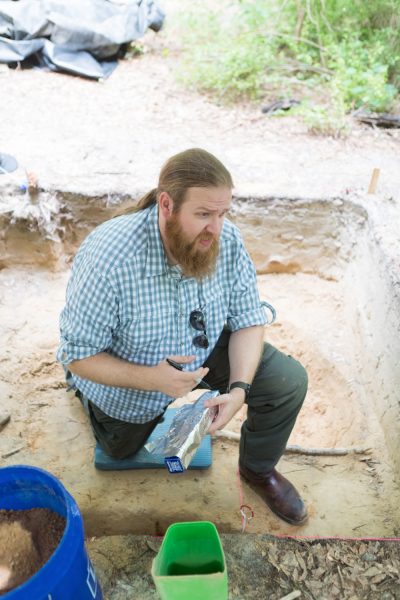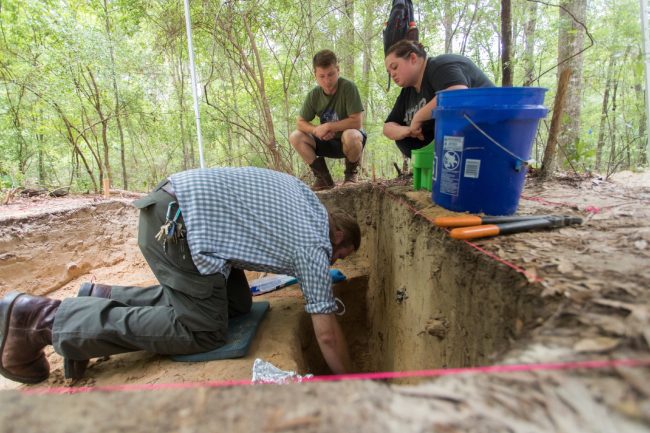Preserving history: Georgia Southern anthropology faculty, students to investigate Civil War battlefields

Few Civil War battlefield sites relating to Gen. William T. Sherman’s march through Georgia have been investigated archaeologically or preserved, but Georgia Southern University anthropology professor Ryan McNutt, Ph.D., is hoping to change that by leading a project that will uncover and preserve two skirmish sites in Jenkins and Burke counties.
McNutt said the project, which is funded through the National Park Service’s American Battlefield Protection Program’s Battlefield Planning Grant, will benefit the students working on the project, tourism in Jenkins and Burke counties, and it will solidify the history of the Civil War in Southeastern Georgia.
“The project will result in a documented inventory of both historic conflict sites, information and data for heritage managers at the state and local level, and the presentation of aspects related to the underrepresented story of Sherman’s War in rural Southeastern Georgia,” McNutt said. “This will aid in preserving the past buried beneath the soil and potentially aid in drawing heritage tourism to Jenkins and Burke counties by raising the profile of both battlefields within the state and region.”
McNutt said graduate and undergraduate students will gain unique experience through the different aspects of the project.
“A graduate assistant will be hired and involved from the start to help analyze data and identify targets, assist in site reconnaissance and visual ground checks of targets, and work as supervisor during the field school,” McNutt said. “On the undergraduate side, training in archaeological field techniques will be received through field schools focused on the data identified, training and educating our students on how and why archaeology is important, the power of preserving history, and creating the next generation of citizen scientists.”
McNutt and his students will investigate the sites using laser imaging, detection and ranging (LiDAR) technology and traditional shovel and trowel archaeology to reconstruct the 1864 conflict landscape and investigate two battlefields. LiDAR works on similar principles to sonar; a LiDAR package in a drone is flown over the target area, and multiple laser bursts are pointed at the ground surface. LiDAR can then generate a bare-earth model that can show any undulation in the landscape bigger than about 50 centimeters, such as old road systems, house foundations and bridges.

McNutt said LiDAR will allow the team to identify Lawton Station, a lost rail depot where one of the skirmishes happened, as well as potential bridges over Buckhead Creek, which were the focus of two of the battles. He said LiDAR could help show forgotten transportation routes, historic structures and environments not used in battle, and field fortifications associated with both conflicts that happened in the area.
“We can then use a GPS to locate these anomalies exactly in the field to basically go right to them,” he said.
The grant will pay for the ability to secure the LiDAR data, as well as scholarships for graduate and undergraduate students for 2021 field schools. The scholarship funds will help students who might not otherwise be financially able to partake in field training and archaeological excavation, including students who were affected by the COVID-19 pandemic.
Economically, Jenkins and Burke counties currently rely a lot on Civil War-related tourism, but it’s mostly related to Camp Lawton, a military prison in Burke County that past Georgia Southern faculty and students helped discover and preserve. McNutt said the project aims to tie documents to local topography and to movement, deployment and action within the battlescape. Tourism related to the Battle of Buckhead Creek and the Battle of Waynesboro, which took place in Jenkins and Burke counties respectively, is currently based solely on historical documents.
McNutt said that while the project will benefit various groups of people, he hopes students will get the most out of it.
“There’s no point in performing research if you’re not using that as an opportunity to educate, improve and engage with your students in order to produce critical thinkers, experienced graduates and qualified professionals,” McNutt said. “To me, the most benefit from the grant is the opportunity for more students to have the chance to travel back in time with each scrape of the trowel and to read the secrets that centuries have spoken into the earth.”
Posted in Faculty Highlights, Press Releases, Research

